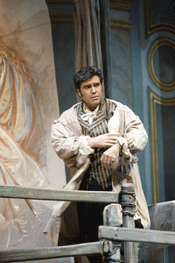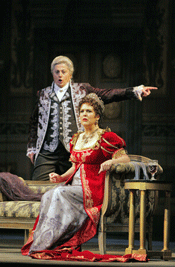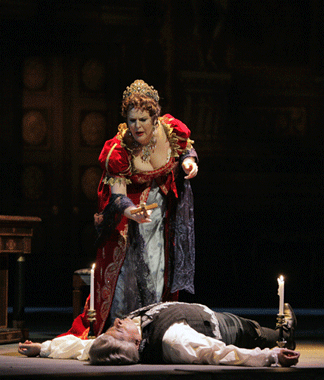![Adrianne Pieczonka (Tosca) [Photo by Cory Weaver courtesy of San Francisco Opera]](http://www.operatoday.com/Picture034.gif)
12 Jun 2009
Tosca in San Francisco
Like Carmen, Tosca is a constant presence in our operatic lives, frequently revisited like it or not.
English Touring Opera are delighted to announce a season of lyric monodramas to tour nationally from October to December. The season features music for solo singer and piano by Argento, Britten, Tippett and Shostakovich with a bold and inventive approach to making opera during social distancing.
This tenth of ten Live from London concerts was in fact a recorded live performance from California. It was no less enjoyable for that, and it was also uplifting to learn that this wasn’t in fact the ‘last’ LfL event that we will be able to enjoy, courtesy of VOCES8 and their fellow vocal ensembles (more below …).
Ever since Wigmore Hall announced their superb series of autumn concerts, all streamed live and available free of charge, I’d been looking forward to this song recital by Ian Bostridge and Imogen Cooper.
The Sixteen continues its exploration of Henry Purcell’s Welcome Songs for Charles II. As with Robert King’s pioneering Purcell series begun over thirty years ago for Hyperion, Harry Christophers is recording two Welcome Songs per disc.
Although Stile Antico’s programme article for their Live from London recital introduced their selection from the many treasures of the English Renaissance in the context of the theological debates and upheavals of the Tudor and Elizabethan years, their performance was more evocative of private chamber music than of public liturgy.
In February this year, Albanian soprano Ermonela Jaho made a highly lauded debut recital at Wigmore Hall - a concert which both celebrated Opera Rara’s 50th anniversary and honoured the career of the Italian soprano Rosina Storchio (1872-1945), the star of verismo who created the title roles in Leoncavallo’s La bohème and Zazà, Mascagni’s Lodoletta and Puccini’s Madama Butterfly.
Evidently, face masks don’t stifle appreciative “Bravo!”s. And, reducing audience numbers doesn’t lower the volume of such acclamations. For, the audience at Wigmore Hall gave soprano Elizabeth Llewellyn and pianist Simon Lepper a greatly deserved warm reception and hearty response following this lunchtime recital of late-Romantic song.
Collapsology. Or, perhaps we should use the French word ‘Collapsologie’ because this is a transdisciplinary idea pretty much advocated by a series of French theorists - and apparently, mostly French theorists. It in essence focuses on the imminent collapse of modern society and all its layers - a series of escalating crises on a global scale: environmental, economic, geopolitical, governmental; the list is extensive.
For this week’s Live from London vocal recital we moved from the home of VOCES8, St Anne and St Agnes in the City of London, to Kings Place, where The Sixteen - who have been associate artists at the venue for some time - presented a programme of music and words bound together by the theme of ‘reflection’.
'Such is your divine Disposation that both you excellently understand, and royally entertaine the Exercise of Musicke.’
Amongst an avalanche of new Mahler recordings appearing at the moment (Das Lied von der Erde seems to be the most favoured, with three) this 1991 Mahler Second from the 2nd Kassel MahlerFest is one of the more interesting releases.
‘And there was war in heaven: Michael and his angels fought against the dragon; and the dragon fought and his angels, And prevailed not; neither was their place found any more in heaven … that old serpent … Satan, which deceiveth the whole world: he was cast out into the earth, and his angels were cast out with him.’
If there is one myth, it seems believed by some people today, that probably needs shattering it is that post-war recordings or performances of Wagner operas were always of exceptional quality. This 1949 Hamburg Tristan und Isolde is one of those recordings - though quite who is to blame for its many problems takes quite some unearthing.
There was never any doubt that the fifth of the twelve Met Stars Live in Concert broadcasts was going to be a palpably intense and vivid event, as well as a musically stunning and theatrically enervating experience.
‘Love’ was the theme for this Live from London performance by Apollo5. Given the complexity and diversity of that human emotion, and Apollo5’s reputation for versatility and diverse repertoire, ranging from Renaissance choral music to jazz, from contemporary classical works to popular song, it was no surprise that their programme spanned 500 years and several musical styles.
The Academy of St Martin in the Fields have titled their autumn series of eight concerts - which are taking place at 5pm and 7.30pm on two Saturdays each month at their home venue in Trafalgar Square, and being filmed for streaming the following Thursday - ‘re:connect’.
The London Symphony Orchestra opened their Autumn 2020 season with a homage to Oliver Knussen, who died at the age of 66 in July 2018. The programme traced a national musical lineage through the twentieth century, from Britten to Knussen, on to Mark-Anthony Turnage, and entwining the LSO and Rattle too.
With the Live from London digital vocal festival entering the second half of the series, the festival’s host, VOCES8, returned to their home at St Annes and St Agnes in the City of London to present a sequence of ‘Choral Dances’ - vocal music inspired by dance, embracing diverse genres from the Renaissance madrigal to swing jazz.
Just a few unison string wriggles from the opening of Mozart’s overture to Le nozze di Figaro are enough to make any opera-lover perch on the edge of their seat, in excited anticipation of the drama in music to come, so there could be no other curtain-raiser for this Gala Concert at the Royal Opera House, the latest instalment from ‘their House’ to ‘our houses’.
"Before the ending of the day, creator of all things, we pray that, with your accustomed mercy, you may watch over us."
![Adrianne Pieczonka (Tosca) [Photo by Cory Weaver courtesy of San Francisco Opera]](http://www.operatoday.com/Picture034.gif)
Like Carmen, Tosca is a constant presence in our operatic lives, frequently revisited like it or not.
Over the years some of the performances have even been memorable — fiery Carmens and intense Toscas, mesmerizing conducting, productions that have occasionally been gripping. And there have been those performances that are imminently forgettable.
We may all have had our favorite performance, the one to which we compare all others. Or perhaps none of the productions we have seen have come near our idea of what the perfect Carmen or the perfect Tosca should be. This latest San Francisco Opera rendition of Tosca will be many things to many people, though it is unlikely to be anyone’s favorite, more likely for most of us it is one to be forgotten. The sooner the better.
 Carlo Ventre (Cavaradossi) [Photo by Terrence McCarthy courtesy of San Francisco Opera]
Carlo Ventre (Cavaradossi) [Photo by Terrence McCarthy courtesy of San Francisco Opera]
Back in 1997 SFO general director Lotfi Mansouri had the kitsch
idea of reviving the 1923 San Francisco Opera production (the first SFO season)
to reopen the repaired War Memorial Opera House. Kurt Herbert Adler had also
once dragged it out for some occasion, maybe it was to commemorate the
company’s fiftieth anniversary. Just now David Gockley must have
calculated the savings to be had by hanging these old canvases instead of
paying for a modern production. And perhaps he believes that these old rags are
like an old sweatshirt, just too comfortable and lovable to throw out.
Here in San Francisco we were once promised the Tosca of Maria Callas, but instead we had the brilliant Marie Collier. We had the Tosca of Magda Olivero at age 71 (she is now 99), a holdover from the golden age of verismo to show us how it was supposed to have been done. And we have had a host of lesser and greater Toscas over the years. The latest one is Canadian soprano Adrienne Pieczonka, whose full, rich and even voice makes a plush, comfortable Tosca quite at odds with the quixotic temperament of the high strung murderess who crosses herself and then hurls herself into the void. Need one be reminded that Puccini’s Tosca is a character defined role.
 Lado Ataneli (Scarpia) and Adrianne Pieczonka (Tosca)
Lado Ataneli (Scarpia) and Adrianne Pieczonka (Tosca)
Cavaradossi was Italian tenor Carlo Ventre who brought bona fide Italianate
vocalism, and bona fide stock Italianate acting gestures. Mr. Ventre comes from
the Carreras mold, heaving his voice from his throat and chest, igniting an
exciting squillo when needed. Preoccupied with tenorial sound he found
none of the sweetness Puccini imbued into the arias of his sentimental painter,
leaving this tenor under appreciated by a crowd ready to cheer. He was however
a strength of the production.
Georgian baritone Lado Ataneli seemed a more versatile artist than his colleagues as he was able to combine singing with character. The sheer power of Puccini’s Scarpia though must tower over the artistic personalities of his victims. He must embody both spiritual and temporal power, and the brute force of pure libido. Mr. Atanel’s more sophisticated approach to his role was instead overwhelmed by the more operatic, less dimensional performances of his colleagues.
 Adrianne Pieczonka (Tosca) and Lado Ataneli (Scarpia)
Adrianne Pieczonka (Tosca) and Lado Ataneli (Scarpia)
Both conductor Marco Armilliato and stage director Jose Maria Condemi
confused verismo with realism, meticulously illustrating every twist
and turn of the text. Verismo is direct, immediate emotion, not
elaboration of detail. It is thus that verismo lends itself to melodrama
— a sudden shocking action that unleashes a huge emotion. Rather than
build to the melodramatic moments that cap each of Puccini’s three acts,
this production lost itself in tedious detail, exacerbated by a Tosca and
Cavaradossi physically incapable of inhabiting their characters. Mo. Armilliato
sometimes took his musical illustration to extremes, forcing his singers to
establish and hold the beat of the text while he dragged it emotively. It was
here that tedium became torture.
Of the smaller roles, the Spoletta of Joel Sorensen was effective, the scenes involving Scarpia’s henchmen were in fact skillfully drawn by stage director Condemi. The Sacristan of Dale Travis and his scenes were terminally cute, the San Francisco Boys Chorus proving itself once again one of our city’s great treasures.
It is time for a new Tosca in San Francisco, a theatrical one.
Michael Milenski